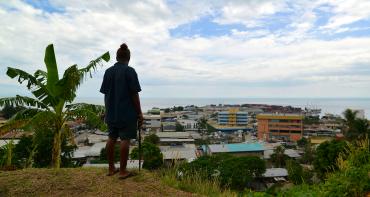Senator Joanne Massiah, Antigua and Barbuda’s Minister of State for Legal Affairs, talks to Commonwealth News about the challenges faced by small states and the issues that can drive development. The Senator had earlier addressed the Second Commonwealth Global Biennial Conference on Small States at the Commonwealth Secretariat on 18 September 2012.
Q: Is it important for small states to get together at such a conference to discuss the issues they face?
Senator Massiah: I think it is important to bring small states together, to allow us to share our experiences and challenges, to share best practices, and for institutions such as the Commonwealth to be able to hear from us directly. The World Bank is also here, but I think it is important for the other developmental partners to be at the table. And I think for conferences such as these to be really effective, there has to be a continuum in respect of the discussion, and clinical studies in countries to really understand in a real way, in an acute way, the challenges which we lay on the table for discussions here. The immediate answer is yes, the bigger answer is more frequently as opposed to once every two years because the challenges are ongoing and they are more acute, particularly given the global economic crisis which has hit us in a real, real difficult way.
Q: What are the biggest challenges that your country faces, and how do they impact on your development and resilience to external shocks?
Senator Massiah: I think all the small island developing states (SIDS) continue to face challenges, with financial stability and the global economic crises affecting all of us in a very adverse way. And so, the stabilisation of the economy to stimulate investment is one of the challenges that occupy our minds at this time. In addition, it is our response to the climate change debate and I hasten to add, as I do every time, that SID countries have not contributed in any major way to the issues involving global warming, etc., yet we are called upon, as with every other country, to devise solutions to tackle this regrettable situation.
Q: What are the most important areas that need to be addressed to drive development?
Senator Massiah: I think recognition by the developed countries that they have a greater role to play in assisting small island developing states to meet their developmental agenda. Certainly, we strive very hard to try to meet the Millennium Development Goals. This necessity – a willingness to share and transfer technology, to share best practices and to ensure that the targets that we have are met with the assistance that these countries can have to offer.
Q: What kind of assistance do you think should come from developed countries?
Senator Massiah: Financial assistance certainly, technical assistance, and I think (as we just had in that discussion) the rules broadly speaking, have to be such that developing countries are at the table. It is very difficult when new policies are formulated which directly affect us without us having a direct input into the conversation to determine whether the new rules, the new requirements are manageable, if they are onerous, etc.
Q: While small states recognise globalisation as essential to aid their development, some have debated whether globalisation has been sensitive to the needs of small states. Is this a real concern?
Senator Massiah: It is a very real concern because when we look at the rules, if I may, governing globalisation, when I look for example at the requirement to liberalise trade, to eliminate tariffs, etc., it is a tremendously one-sided equation. The developing countries often don’t have the capacity, don’t have the resources to meet some of the minimum standards that are set. I think, for example, of agriculture and the rules which govern movement of goods, of food across borders. And so, you see, in a lot of instances it is a one-way flow when it comes to globalisation, where a lot of the goods are coming from the developed world into small states, which have the ability to stymie local production and local manufacturing because at the end of the day competition is the name of the game, and in a lot of instances, our goods remain uncompetitive because on both sides the playing field certainly is not equal.
Q: Is there room for preferential treatment on trade between countries even as the focus deepens on globalisation?
Senator Massiah: I think there ought to be an accommodation. While I don’t believe that we as a region should have in our mind or establish as a policy that we need preferences all the time, I think what needed to have happened was greater assistance, greater input by the developed countries to ensure that the necessary transitioning of these countries which enjoyed a lot of preferential treatment whether for sugar or for rice was sufficiently stable before the preferences were removed. It is not very easy to have a country whose economy is largely dependent on a one crop situation for the better part of what, 300 plus years, and so skills in a sense were focused and honed in on that particular sector and its development.
And so when you think about transitioning a worker who has spent his or her life in sugar production, rice production, to what I imagine would be a nascent industry for them such as tourism, it’s two totally different skill sets. How do you then reorient the workforce to be able to meet the challenges attendant upon the services that are required? How do you ensure that the country, in shifting to another sector has sufficient support to be able to transition well into a new sector? Perhaps some may argue that we were aware that it was coming and that the preferential treatment would end, but I guess the bigger question is how much time is sufficient time and that is a question I don’t think the developed world has answered sufficiently and to our satisfaction.
Q: There have been calls for equitable reform in the international trading system by some small states. Is this a legitimate call, and is there need for a greater global understanding?
Senator Massiah: I think it is a legitimate call, and as I said before, what is required is honest, frank and open discussions at the trade table. I think if we are able to understand some of the unique challenges which developing countries face, then I think we can collectively fashion arrangements that ensure that both sides have greater equity, that the win-win situation, as we call it, is a little more evenly distributed so that the benefits which would inure to developing countries as such that we can build on our capacities, we can strengthen our sectors, we can be better able to respond to some of the challenges which we are now facing, and I am sure we will continue to face in the long run.
Q: Is it important for your state to be a member of an institution like the Commonwealth to bring the type of issues that you are facing to a greater audience?
Senator Massiah: I think so. In today’s environment, I think it is important for all countries to be at the discussion or negotiating table because it makes no sense to absent yourself and then you wake up one day to realise that rules have been put in place that affect your ability to function in a meaningful way as a sovereign state; and to meet the developmental challenges head on, which your country faces, as well as to ensure that social issues are met, environmental issues are understood and translated to the greater population, etc. So, I think it is important for all countries to be represented at institutions and conferences such as these.



